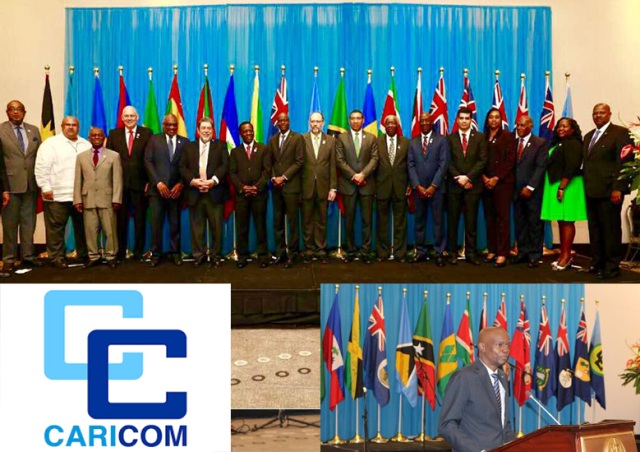CI Shorts: What Caricom did next

Caribbean Community (CARICOM) leaders met in late February, at a time when major global events have been making quite an impact on the region. With counter-terrorism demanding more attention and the region’s former Western partnerships going through their own big changes, the unpredictable world stage provided a packed agenda for the 15-member group’s gathering in Haiti.
Caribbean Intelligence© has gone behind the communiqué comments on climate change, regional solidarity and the day-to-day work of the grouping to find some of the highlights which could affect the lives of CARICOM nationals in the near future:
- CARICOM leaders approved a Counter-Terrorism Strategy. This agreement will lead to legislation on countering terrorism being taken to the parliament of each member state before the full CARICOM summit in July. Trinidad and Tobago's Prime Minister, Dr Keith Rowley, who leads the regional Council for National Security and Law Enforcement (CONSLE), spoke to reporters on his return home about the terror threat facing his country and the region. He said that people could not “bury their heads in the sand” about the involvement of Trinidadian citizens with ISIS and had to face the reality that some nationals had travelled to what he called “zones of conflict” and had now returned to Trinidad. His comments followed foreign intelligence travel advisories ahead of Trinidad’s early February Carnival, which had led to a security clampdown during the events and the detention of 15 people. The CARICOM counter-terrorism strategy will allow for the sharing of information between member states. Trinidad subsequently announced that it is also working closely with the US, Canada, the UK and the Netherlands on sharing information, as intelligence indicated that more than 200 Trinidad and Tobago nationals who had been “known to express sympathy with and had contact with ISIS” had returned home.
- Leaders signed a Multilateral Air Services Agreement (MASA), aimed at giving an edge to regionally owned carriers. The agreement eases restrictions on routes, allowing people and cargo to travel more easily on certain airlines. The move is expected to help with intra-regional travel when passengers use Caribbean-owned airlines. The CARICOM Secretariat said that the agreement “should provide a major boost to the regional transportation sector, which is a critical aspect of the Caricom Single Market and Economy (CSME) ” that allows for the free movement of goods, skills, labour and services across the region.
- CARICOM stepped up the pace on integration with Dutch-speaking parts of the region, with agreement for negotiations to begin on the grouping’s so-called “enlargement policy”. CARICOM Secretary General Irwin la Rocque said after the inter-sessional meeting that he will be holding talks on associate membership with officials in the Dutch territories of Curacao and Sint Maarten. Originally a grouping forged from the former West Indies, CARICOM has already embraced Haiti, which is currently CARICOM chair, and Suriname. CARICOM leaders also gave consent for consideration of applications from the French Overseas Territories of Guadeloupe, Martinique and French Guiana. To date, the British dependencies of Anguilla, Bermuda, British Virgin Islands, Cayman Islands and the Turks and Caicos Islands are the only associate members of CARICOM.
- CARICOM leaders took aim in their final communiqué at the European Council labelling of some member states as “tax havens”. Describing the EU process of categorising banking and tax practices as “unilateral”, CARICOM said that its member states continued to work on meeting all requisite standards set by the globally recognised authorities in respect of global tax co-operation and related initiatives. The communiqué pointed out that this work is “often at significant cost, to advance the implementation of agreed international standards domestically”. Leaders agreed that their finance ministers and Central Bank governors will meet soon on this issue and that CARICOM will look at forging links “because of shifting global standards”.
- Caribbean heads of government agreed to intervene in the way West Indies cricket is run. Stating that legal opinions indicated that cricket is a “regional public good”, CARICOM said that it would be charting a course of action on the governance of West Indies cricket. The planned intervention comes at a time when the West Indies Cricket Board continues to battle with its top players over a number of issues. Leaders said that, as politicians, they had no intent to manage West Indies cricket, but that they would look at a legislative framework to govern regional cricket which is consistent with international best practices and in line with International Cricket Committee (ICC) principles. St Vincent and the Grenadines’ Prime Minister, Dr Ralph Gonsalves, will lead a team which will meet the ICC in April. The outgoing CARICOM chair, Grenadian leader Keith Mitchell, said that the community “must take responsibility for what should be a public good”. After arriving home from the leaders’ meeting, Trinidad’s Dr Rowley told journalists: “We cannot sit idly by and be told to mind our business. The state has a big stake in WI cricket, which is part of our heritage, and that is why it was deemed to be a public good.”
The next CARICOM Heads of Government Meeting will be held in Montego Bay, Jamaica from 4-6 July 2018.
Read the final communiqué for yourself.





